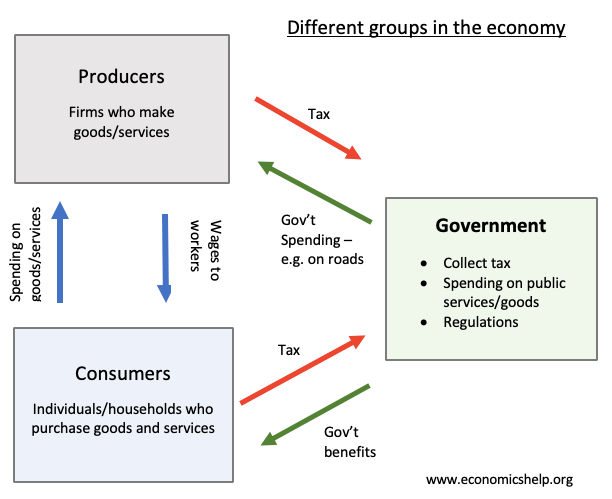In economics producers – often referred to as firms or companies play a role in using inputs (different factors of production) and producing goods and services (output). Firms play a key role in deciding what to produce and how to produce.
Different types of firms
- Individual entrepreneurs – self-employed individuals
- Private companies – often small/mid-sized companies who are owned by a small number of individuals.
- Public limited companies – generally large companies who are listed on the stock market. The public can buy shares in the company and share in their profits.
- Co-operatives/social ventures. Firms which are not targetting profit maximisation but exist to further particular social and economic goals.
- Government-owned companies – In some industries, the largest firms are State-owned companies. For example, British Steel, British Coal. British Rail, Royal Mail (all used to be state-owned firms) in some cases, state-owned firms are monopolies operating in an industry with significant economies of scale.
The role of firms in an economy

Firms play a crucial role in the circular flow of income within an economy
- Firms employ different factors of production. This includes employing workers (labour) to produce goods and services. By employing labour, firms pay wages creating a flow of income to households, which ultimately can be spent by households on goods produced by different firms.
- Developing new products. In the pursuit of profit, firms will try to respond to consumer preferences and develop new goods and services. For example, in response to increased demand for coffee, firms have opened new stores to cater for the new demand. In addition, firms may try to anticipate what consumers would like be developing new products they hadn’t assumed were possible. For example, Apple developing the iPod and iPhone (rather than trying to improve the old CD player) It can also involve offering new services such as home delivery by supermarkets.
- Investing in capital and new technology. Firms will seek to make the most profitable use of capital and labour. This will involve developing new technology and working practices to improve productivity in the economy. Through seeking to cut costs, and invest in new capital, it contributes to higher productivity and ultimately higher living standards. Without the process of innovation and investment, economies would be more stagnant with slower living standards.
- Providing goods and services for the consumer. Firms which produce a range of goods and services enable greater specialisation in the economy. In a very basic economy, there were no consumers as individuals devoted their time to growing and catching their own food. Through firms offering the ability to sell food, it enabled some workers to leave the land, and work in manufacturing non-food items. In recent years, many successful firms have concentrated on developing time-saving products, which enables people more free-time to work. For example, labour saving devices such as washing machines, vacuum cleaners, childcare have saved time for ‘household chores’ enabling women to enter the labour force in greater number.
- The principle of creative destruction. J. Schumpeter termed the phrase ‘creative destruction‘ He argued that when inefficient firms went out of business it enabled a redistribution of resources towards more efficient uses of resources. This creative destruction is behind the economic development of market economies.
Potential problems of firms
- Negative externalities of production. Firms may ignore the external costs of production, leading to social costs being significantly higher than private costs, e.g. pollution and loss of natural resources.
- Monopoly power. Firms with monopoly power can charge excessive prices and cause an inefficient allocation of resources
- Short-termism. Firms which are publically owned have a duty to try and increase profits for shareholders which can lead to a short-term perspective.
Related
